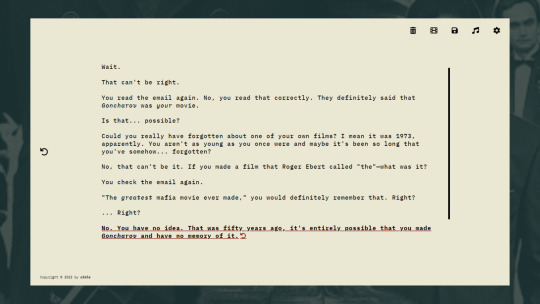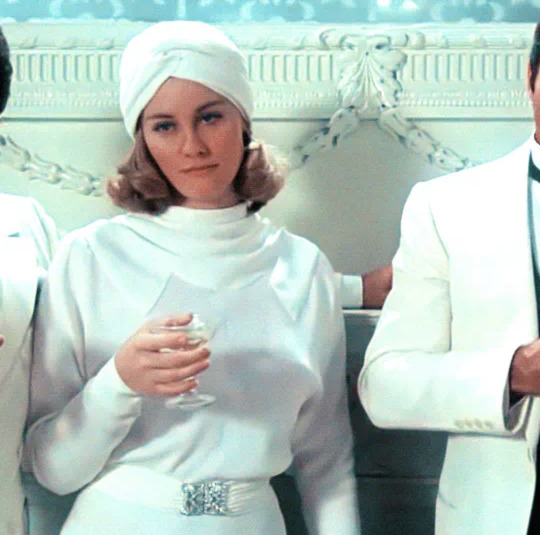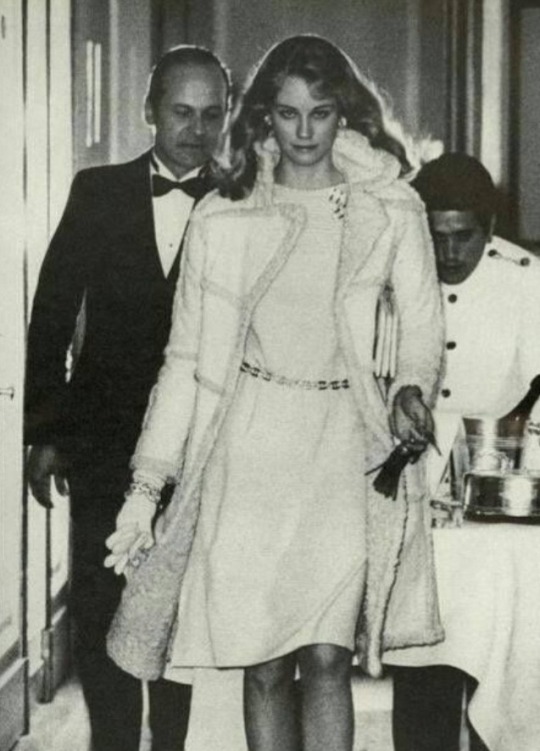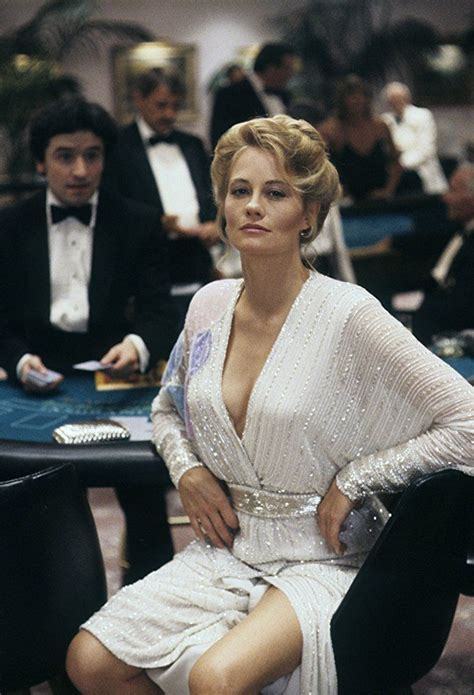#goncharov meta
Text
tired of everyone on here reducing icepick joe down to haha funny stabby man
like i DO like the jokes and memes, don't get me wrong, but like
there's SO MUCH to his character and he really does tie into goncharov's main themes
like. we're told early on the he was put into a mental institution as a young man due to his breakdown and inconsolable grief at losing his older brother giorno (who was his only living family and basically a father figure to him!)
wherein he was mistreated and was HEAVILY IMPLIED to be scheduled for a lobotomy before he escaped. (in fact, some interpretations say he actually received and survived the lobotomy, citing his manner of speaking and his lack of impulse control. but that's a whole separate discussion because i can honestly see both sides)
and then he turns to a life of crime because that's basically the only option he had left, after being deprived of so many opportunities in his youth (and the fear of being caught and involuntarily institutionalized again)
and him eventually leaning into the role of "violent madman" that the world thrust onto him for showing signs of mental illness in a way that was nonviolent, but was loud and inconvenient and impossible for those around him to simply push away.
and him taking his rage out at the same world that not only killed his brother but forced him to undergo years of psychiatric abuse and basically dehumanization
(like seriously, how do SO MANY people miss the connection between him using an icepick as a weapon and the concept of an ICEPICK lobotomy)
which. yknow. ties heavily into the film's theme of people being pushed to society's margins and forced into a life of crime, instead of given the help they desperately needed
and then like.
his fucking death scene. he tries to put a stop to the cycle of senseless violence, taking the fall for andrey, telling michailov that *he* was the one who killed luciana
him kneeling down and allowing michailov to bash him through the skull with his very own icepick. it's more lobotomy symbolism; dying from the very thing he spent his whole life running from. further driving home the film's themes of repeating cycles and futility
and then, to drive it all home, that sacrifice didn't even end up stopping the cycle of violence! because andrey viewed joe as basically an older brother (mirroring joe and giorno) and tried to get revenge on michailov for killing joe.
like. come on.
#eliot posts#goncharov#ice pick joe#valery michailov#andrey daddano#goncharov meta#psychiatric abuse mention#unreality#death mention#violence mention#ableism mention#involuntary institutionalization tw#lobotomy
3K notes
·
View notes
Text
ok but i cannot stop thinking about the IMPLICATIONS of the final scene with katya and sofia. katya is an immigrant. she left her homeland with goncharov when she was sixteen. she took on his name, his business, his sins for twenty years. by the end of the movie, everyone she knows and loves outside of goncharov's ring of destruction is either dead or wants nothing more to do with her.
sofia was meant to end katya: her relationship with goncharov, her place in goncharov's business, her life. goncharov let sofia into their lives to make katya jealous, to amplify katya's insecurities so that katya would stay loyal to him. and then we find out that sofia was literally sent to kill them. to end the goncharovs not only in the figurative sense but the literal one.
but she can't do it, so she leaves. now what does katya have left? who is she even anymore? she's not a goncharov; she destroyed that part of her when she betrayed him. she's not ekaterina, the name her mother gave her, the name she bore when she was a scared little girl: that person died a long time ago. this movie is so special because the female side character has her own journey that mirrors the main character's: your old self is dead. who is your new self?
so she goes to paris, to be with sofia. sofia, the woman who was meant to destroy her. and she lets it happen. she lets sofia destroy katya goncharova. her old self is dead. and she is finally free :')
#goncharov#goncharov 1973#katya goncharov#katya goncharova#martin scorsese#goncharov meta#this mass hallucination is HITTING#katya x sofia
2K notes
·
View notes
Text

Still can't find a working link for Goncharov (1973), but...
Creating Goncharov is live on Itch.io!

Everyone knows Goncharov. Martin Scorsese's 1973 film is a cult classic, a true masterpiece of cinema. To celebrate its upcoming 50th anniversary, you, an office drone working at a major media corporation, have to create a pitch for a 2023 remake. It's an amazing opportunity that could launch your career. There's just one problem.
You haven't seen Goncharov.
Unable to turn down your corporate overlords, you and an indecisive colleague throw together a story based solely on information you can quickly find or invent.
How will you reimagine the greatest mafia movie ever made and what will you do to turn your ideas into reality?

Creating Goncharov is a surreal interactive fiction game created for Autumn Chen's Goncharov game jam. This game was written and coded by Albie. For more games by Albie, click here.
Play it here!
CW: Unreality and brief descriptions of smoking, violence, and death
Featuring the song "Main Theme from Goncharov" by @caramiaaddio. Original poster by @beelzeebub. Game screenshots below the cut.
Check out the other games made for the game jam here.

Goncharov is a fake film. Read more on it here.










#goncharov#martin scorsese#interactive fiction#surreal#lgbtq#fanfic#indie game#game dev#goncharov 1973#twine game#game jam#comedy#goncharov game#metafiction#goncharov meta#creating goncharov#unreality#cw unreality
1K notes
·
View notes
Text
It makes me so mad when people are like “oh Andrey betrayed Goncharov for money” like . . . that’s such a sad and flat way to look at the narrative . . . it’s obvious that the money is a device to make the Judas-Jesus parallel clear? Andrey, after all, makes of that money just as much as Judas does with the thirty silver coins, i.e. nothing. It’s not about the money, it’s about the misplaced resentment. The money is just a circumstancial occasion to let the frustration and disillusionment bubble to the surface and bring the character to action.
Maybe it’s my catholicism talking but it seemed quite blatant to me that Scorsese was going for the vibe of the interpretation of the Judas story as Judas being Jesus’ most fervent and dedicated follower until he realized that Jesus was not in fact going to do what Judas expected from him (actual revolution/guiding an armed insurrection?) and it was the force of his disappointment and sense of betrayal that brought him to betray Jesus in turn.
Consider that Jesus Christ Superstar premiered in Broadway in 1971?? The musical is focused on that interpretation of Judas’ role in the gospel story. I’ll eat my hat if the screenwriter and director didn’t have that in mind while making Goncharov.
The movie is hardly a story about mafia men betraying each other for mafia reasons. It’s about human beings going through a path of destruction because they’re trapped in toxic dynamics that don’t allow them to pursue healthy interpersonal relationships.
Ironically, Goncharov and Andrey’s feelings for each other by the end of the movie, in their horrifying brutality, are the most genuine and heartfelt feelings that any character shows in the movie for another. It’s like, in their world, the only way passion and devotion can exist is in blood.
Talking about a metaphor for repressed queerness . . .
769 notes
·
View notes
Text
Katya: If my options are to be treated the way an old hare is treated by a pack of young dogs, or to be forgotten by the world, then may no soul ever utter my name again!!!
Goncharov: You are speaking with the confidence of a woman soon to be dead, Katya.
The birds who just came for some of Katya’s gnocco fritto:

#Goncharov#goncharov (1973)#goncharov meme#Goncharov katya#goncharov memes#unreality tw#movies#goncharov meta#goncharov analysis#goncharov posting#They just wanted to be fed man
570 notes
·
View notes
Text
Goncharov through a transmasc lens
The deep symbolism of violence as love ("If you really loved me you wouldn't have missed" and how Andrey didn't miss) is accentuated if you watch the movie and imagine Goncharov or Andrey as trans.
If you imagine Andrey as trans, it explains Katya's hatred for him as his former lover as well as her chemistry with Sofia, and adds a layer to their animosity. It also adds depth to Andrey's choices and why he falls more easily into the tropes of toxic masculinity in his attempts to prove himself as real a man as Goncharov throughout the film. He is often in the shadow of Goncharov I think it works as well with Andrey constantly comparing himself to Goncharov as the ideal of what kind of man he wants to be. He both wants to be with Goncharov, and wants to BE Goncharov. Killing him at the end of the movie is an act of consumption, consumation, and replacement.
However, if you imagine Goncharov himself as trans, then that adds a layer on to why Katya ultimately rejected him, and why he only found true companionship with Andrey; why Andrey was the only one who could ultimately fulfill "love" in the way the movie demanded. Andrey accepted Goncharov for who he was; and that obsessive love met its end as it only can in such tragedies.
#goncharov#unreality#fiction#trans#transgender#trans man#trans masc#goncharov meta#goncharov analysis
523 notes
·
View notes
Text
Red and White: A meta analysis of color and the subversion of morality in Martin Scorsese's Goncharov (1973)
Katya Goncharova

By now everyone knows that Katya is the Woman in White. Aside from the obvious ghost/haunting implications of this color scheme, white can be used to signal purity, something Katya should, by all accounts, have left far behind.

So is this a subversion of a cliche and outdated ideal of purity (although not at the time of the film's creation, making this possibility even more daring and subversive), or is there another meaning? Virginity and innocence are only two types of purity. There is also love, and the complex purity that often accompanies it. Katya is, at her heart, a very emotional and loving person. She may not show it as openly or loudly as Sofia, but it's undeniably there: her love for her husband, and, of course, for Sofia.

It's also an interesting departure from the red/black femme fatale/black widow color schemes of Soviet women spies and assassins in films made around the same time. Katya is a killer and a player in this deadly game, yes, but at her core she wants so desperately to be a good person, to escape the life her husband has condemned himself to. Katya hopes, against all odds, that love can redeem her. Perhaps her insistence on always wearing white is meant to hint at her longing for innocence and purity, even though her hands are already stained red.

Love and its complexities, as well as the discussion of traditional red and black color schemes used for femme fatales brings me to
Sofia

Sofia is both Katya's foil and mirror. She challenges Katya's morality by upholding her own, living off a value system that, while twisted in its own way, is ultimately one of the strongest moral compasses in the film. Her descent into the role of killer is not only Katya's doing; Sofia was destined for bloodshed long before they even met, and only comes into her own as a real player after the cocktail scene. This is demonstrated through Sofia's red and black color scheme, which, as I mentioned earlier, is typically associated with femme fatales and black widows.

However, Sofia also wears white, notably at the end of the film after the Boat Scene, after her descent into destruction and The Life. This shot is especially powerful, as it uses a red backdrop to emphasize the change that Sofia has gone through, and her merging with Katya while also retaining her own history and morality.

While she starts out as Katya's foil, over the course of the film the two women begin to merge, their twisted morality aligning until Sofia's femme fatale false persona become her truth. It is only then that she comes into her own and begins wearing white, and, interestingly, that half white/half red color pink: the mixed feelings and emotions of a changing woman.

Ultimately, color plays a critical role in Goncharov, especially in the portrayal of Sofia and Katya and their complex, emotional, and ultimately tragic joined fate. Sofia loses the vibrant reds and deep blacks of her scheme after the Cocktail Scene, which is when it seems that she's finally accepted her feelings for Katya and lost herself to that lifestyle. She has spilled blood, and the red of her clothes becomes the red on her hands.
For example, this is Sofia's outfit before and during the Boat Scene:

This is her outfit directly before the Cocktail Scene:

Tumblr won't allow me to add another image (reached my limit ranting it seems lol) but in Sofia's final scenes, she is seen in all white, just like Katya.
Winter has, truly, come to Naples, and it has swept Sofia up in its bitter white embrace--the embrace of a colder, more calculating mindset and morality, as well as the literal embrace of Katya Goncharova, her salvation and her doom.
#(i couldnt find a reference for Sofia so i picked Kathleen Turner because i think she has Sofia vibes lmao)#Goncharov#goncharov 1973#mafia wives#katya x sofia#goncharov meta#sofya#unreality#tw unreality
556 notes
·
View notes
Text
pulling goncharov meta out of her ass is the most fun a girl can have without taking her clothes off
#if you even care#this is the most fun i’ve had in WEEKS#goncharov#goncharov meta#martin scorsese#*greatest hits
436 notes
·
View notes
Text
Goncharov: Fandom's Struggle Between Fanon vs. Canon and How That's Created A Mythos Rivaling The Greeks
A tag ramble to this post that got away from me and became too long to feel okay putting in the tags lol. It can be easily read as a stand alone though.
It's absolutely FASCINATING to me being able to both watch and participate in the Goncharov (?)fandom(?). It's taking everything that fandom culture is and letting it run free without any barriers to stop it.
Because frankly, I can't think of anything (to my knowledge) quite like it in recent history to reach such a scale. Both the ability to write stories down and the rise of copyright have had a significant impact on the way stories are told. We went from a storytelling culture that slowly evolved each story told by the person telling it, to one that is very close-handed to the narratives created.
And yes, to some extent, this twisting and evolving still happens in fandoms to the point that fanon and canon can become so separated it feels jarring. But that's just it isn't it? There always remains the canon. That will always be the true story. Fanfiction will forever be fanfiction, no matter how much we want it to be "real." You can whittle away at the narrative to shape it into something more appealing, but it will always be stuck as a block of wood.
Yet, the very fact that fanon exists proves that we never lost that want to change stories and make them a little bit our own. All that we lost was the medium to do so. Evolve something too far, and it won't be the same, will it? We're stuck in the confines of "canon."
I have seen fanfiction of fanfiction before, but it tends to quite quickly pitter out without its own foundation to stand upon. More can be added to the universe, but what's there does not change. It does not evolve the way a story passed down orally does; in a story spoken, the canon is forced to slowly change by the memory and style of the speaker. A classic game of telephone.
Goncharov however? There is no original story; there is no true canon. Not only is the story evolving freely from storyteller to storyteller, but the only reason there is even a coherent story in the first place is that there are multiple storytellers weaving the tale at once yet also expecting you to fill in the gaps.
It's like we're all playing that one writing game where each person writes a sentence back and forth to create a story. Yet, instead of you and one friend, we're playing it on this gargantuan sitewide scale that can't possibly all be connected into a singular coherent narrative. But you're not supposed to be able to. Each person can choose what they want to know it as. It's like some big giant exploratory choose-your-own-adventure book. The framework is there, but it's going in 50 different directions and you can always add another one in just for fun. You discover the story as you read, but only the bits you like get added on.
It's fucking incredible.
We all see each piece of media through our own personal lenses but never like this?? Not to this extent. We're all collectively joining together to obsess over the little ideas in our heads we got from each other's prompts and are excitedly spewing them regardless of how contradictory they are. We do something similar brainstorming with others but not with 12k messages in a single day.
Would this have even been possible before the rise of social media? Not to mention the strong sense of community Tumblr has that is so rare to see with such a large amount of people. There's more people than you could ever know on this site but we all act like some deranged extended family. Yes, people can work together but so rarely do people that vary so greatly in personality and life experiences, get together in such larger numbers to do a little silly goofy CREATE AN ENTIRE STORY THAT DOESN'T EXIST.
We pull shenanigans like this all the time. But this time it's not like eeby deeby or even the mishapocolyse; this time we're seeing the power of an entire community working together to create not only layers and layers of memes but layers of memes shaping an entire mythos. It's like we're the Greeks thinking up stories of our gods but instead it's a homoerotic mafia movie from 1973 written by Matteo JWHJ 0715 and Martin Scorsese that all started with a picture of a shoe.
We have stumbled across something fascinating and new. This may not be the first mafia movie that's been thought up and played around with but this is absolutely the first to be created by thousands of people working together but also towards their own individual goal/story. We're seeing the power that created mythology being wielded by fandom culture, and it's letting it evolve like no other story has.
It's free from the confines of prescribed canon, but there is so much being created that can be canon if you want it to be. This isn't changing one by one like some spoken tale towards exponential growth either. This has been created like one spectacular big bang. We had a funny post of a boot, and then we had a poster and that was enough to make Tumblr go collectively insane. (Not that we weren't already.) I want to (politely) shake all of you by the shoulders till everyone realizes how crazy this all is.
This story is ours, all of ours. Goncharov (1973) is held together by the power of belief and love for it. We have fragments of canon, yes, but it only exists because we want it to. And God-damn it, I hope we do it again. Together we can create things that we'd never thought could exist (and in this case still doesn't).
-We- are strong. Please never forget that.
As it now 6am and I have not slept, I will leave you with a quote; Goncharov's final solemn plea as he slowly bled to death, for I feel it's in an odd way rather fitting.
"What is the dust but a remnant of what we once were, all around us coated with it.
But we brush it away in search of something else. Not everything that mattered once matters now.
Yet you seem to think that's the only way, just keep dusting it.
You never stop to think that some things we search for might not be worth keeping.
Nothing has meaning unless we continue to think it does.
So please... I beg of you, can't we just move on and let this sickening contempt between us dissolve into dust?"
413 notes
·
View notes
Text
One of my favorite things about the 1973 classic Goncharov is how the opening scene leans heavily on reds - deep crimsons, jeweled scarlets, even warm tones in creams, blacks, and blues. Scorsese has always been known for his use of red to indicate dynamism and danger - consider the dining scene in Goodfellas, where it appears they are having dinner in Hell - and it's interesting that we see it here, in a simple scene where Andrej is sleeping and no danger should be present.
Then, the remainder of the film is linked by the opposite color, blue. Each scene is thematically tied together by either a blue tint or the presence of something large and blue in the background (e.g. the drinks by the pool scene). As the film goes, blues are increasingly tempered with reds until we get to the red-tinted final scenes, bringing the film full circle. Also, if we compare the sound of the engine backfiring in the first scene to the sound of the gunshot in the final scene, we can see that they are actually identical, leaving one to wonder if Goncharov is instead the story of the last firing synapses of Andrej's dying mind.
441 notes
·
View notes
Text
You know what I find interesting about the Goncharov (1973) phenomena? Tumblr had the opportunity to make Goncharov and Mario or Andrey or Sergei explicitly gay - they had the chance to write the next cookie-cutter bland Gay Pairing that fits into the current fandom trends of ship hopping and washed out boring dudes... but they didn’t.
Yes, many people wrote homoerotic subtext for Katya and Sofia and for Goncharov and Andrey, people faked academic queer readings of this masterpiece or wrote about the subversion of toxic masculinity within the film...
But as a collective we decided that all of this would be subtext. We decided that Katya and Goncharov are married, and it might not even be a loveless marriage (the jury’s still out on that one) after all. We decided that it’s a tragedy with Goncharov being betrayed by his wife, and killed by Andrey (which is often read as a sign of love and commitment). We gave a side character the ability to break out of the narrative, Ice Pick Joe the only character who escapes the circle of violence while everyone else falls victim to the narrative - time is a flat circle, after all, and loss of identity and the inevitability of one’s fate are the central themes of this fake movie.
We could have turned it into a gay romcom or a mafia spoof or some flat reimagining of movies from a long time ago.... but we chose to turn it into something that is far rarer and more fun to analyze: a tragic tale of love and betrayal and queerness and the horrors of the cold war and lonliness and death and time.
Our reading of Goncharov (1973) is queer - but the movie itself isn’t.
(only that it is, because we created Goncharov and as such we are a part of its story)
#goncharov#goncharov meta#ice pick joe#katya goncharova#andrey goncharov#queer#meta analysis#not gonna lie#i like the fact that its not explicitly queer#and i love the fact that its a tragedy
320 notes
·
View notes
Text
what i love about goncharov is that it's like... community worldbuilding that took full form EXTREMELY suddenly and with incredible fervor based on a single post from ages ago. and it's all localized entirely to tumblr. it's like if blaseball and morbius had a sleeper cell chernobyl baby
246 notes
·
View notes
Text
I can’t stop thinking about Katya and Andrey but y’all I never really shipped them, mostly just FELT for them. I mean, this exchange???:
“Maybe if we were one person, you and I, we would be enough for the world.”
“You mean for him.”
“Is there really a difference?”
“For us? …I guess not.”
I mean…!!!
#the IMPLICATIONS#the way this solidified gonchrey being true on andrey’s end + hc that the goncharovs weren’t a loveless marriage to start with#but also that goncharov doesn’t deserve either of them#ugh#I mean I don’t hate any of them but this scene almost made me hate gonch ngl#goncharov 1973#gonchrey#goncharov#goncharov meta#goncharov (1973)#andrey#justice for katya#katya deserved better#katya goncharov#katya goncharova#andrey x Katya#Katya x Andrey#again I don’t ship them but for the tags#Katya x gonch#gonchya#gonch x Katya#gonch x andrey#Andrey x gonch#unreality
267 notes
·
View notes
Text
Listen, LISTEN. Yes, yes, he’s Goncharov, we never learn his first name, but the fact that he is officially also credited as “Lo Straniero”? Perfect. Unparalleled. Because Lo Straniero is means both foreigner and stranger. The first, I mean, it’s obvious. But stranger? Yes.
Goncharov is a stranger to us - we never know his name. He is a stranger to Naples, I would argue he’s even a stranger to those closest to him. Can we really even say Katya knows him? The person he is supposedly closest to? No one knows Goncharov, he is a foreigner in a foreign land, but he’s also a stranger to all around him, and likely even to himself. One of the major themes of the movie is that he doesn’t know who he is or what his legacy will be (all those clocks...) but it’s just the commentary that the official credits offer that’s really just chef’s kiss to me.
#Goncharov#unreality#goncharov meta#and it's not even MY meta it's the meta narrative in the FILM CREDITS
315 notes
·
View notes
Text
A lot has been written, including academically, about the reason of Goncharov (1973)’s relative low popularity being the fact that the movie is so hard to pinpoint to a genre - people who expect a mafia movie get a manifesto of queer subtext and very little actual mafia action, etc (funnily enough now we have the opposite problem aka teenagers on twitter complaining that it’s not gay enough lol).
But I was also thinking that there might be another factor in this, i.e. that Goncharov’s role in the movie also defies expectations. Movie bros that are used to Marvel flicks where the title is the name of the characters who Does Things And Saves The Day, like Iron Man or whatever, usually end up complaining that the movie is bad because Goncharov doesn’t really do anything.
But that’s the point, isn’t it - Goncharov is not about a guy who Does Things, Goncharov is about the people around the titular character, the way they are affected by Goncharov and how they move in the narrative chessboard in relation to Goncharov. Goncharov is a fairly static character, the movie happens around Goncharov. I think this is why so many people complain that the movie has so little action and so much talking - that’s because Goncharov is not the main character of an action movie, but he’s the pivotal element of a narrative that unravels all around him with him as the semiotic center.
I might almost say that Goncharov kind of resembles the princess in the tower of traditional folktales, in a way - sure, he does things that affect the plot, but he represents the element that puts the narrative into motion, although in this case it’s not knights going to save the princess but the mafia plot (then again, the plot is very little about the mafia, that’s pretty much only the loose setting the narrative develops in).
I think that’s the beauty of the movie. You expect it to be something, but it’s something very different - something a lot more complex and touching. No wonder it has become so popular with the largely marginalized demographic based on tumblr.
375 notes
·
View notes
Text
I didn’t want to have to say this, but: anyone who thinks that the Boathouse Scene was a “Girlboss moment” has completely missed the point of Katya’s character arc and, frankly, the movie as a whole.
Katya’s arc is about the ways that her life is defined by the men around her. Goncharov, Andrey, Valery - they all have their own ideas of how she should act, who she should be. She doesn’t want to be a housewife, but in the strictly gendered society she lives in, she isn’t allowed to seek fulfilment beyond that.
The subtext of the conversation in the market is pretty blatant - Katya wants to be allowed to discover who she really is away from the obligations of her family, lovers, and husband. Sofia giving her the apple represents the offer of that freedom. Some people have interpreted this as a temptation - the serpent with Eve, and all the pseudosexual tension that implies - but I view it as an intentional subversion of that image, given the way Sofia is haloed in light throughout the scene. (The homoeroticism is real, though!)
I can see where some people get confused by the ending, because Katya does successfully escape her domestic life - but she doesn’t achieve that through the spiritual offer of self-knowledge Sofia represents! Her love for Goncharov and Andrey won’t allow that. Instead she betrays Sofia and winds up in the boathouse, holding the gun; the men around her have finally dragged her into their life of violence. She might survive the end of the movie, but she has lost everything she cared about, and instead of pursuing the independence she initially wanted, it’s implied (I heard confirmed in a cast interview? if anyone has a source for that let me know!) that she returns to Russia to pursue further vengeance.
Katya’s story arc is not about her being a Girlboss - she isn’t beating the men at their own game, or if she is it’s not a game worth playing. Katya is a tragedy, and a warning about the way the violence of men damages the women around them. Killing is never something to aspire to - it is only, as Valery says, “a clock ticking down to midnight.”
#goncharov#katya goncharov#katya goncharova#katya michailov#katya x sofia#goncharov meta#my thoughts#things i made
285 notes
·
View notes